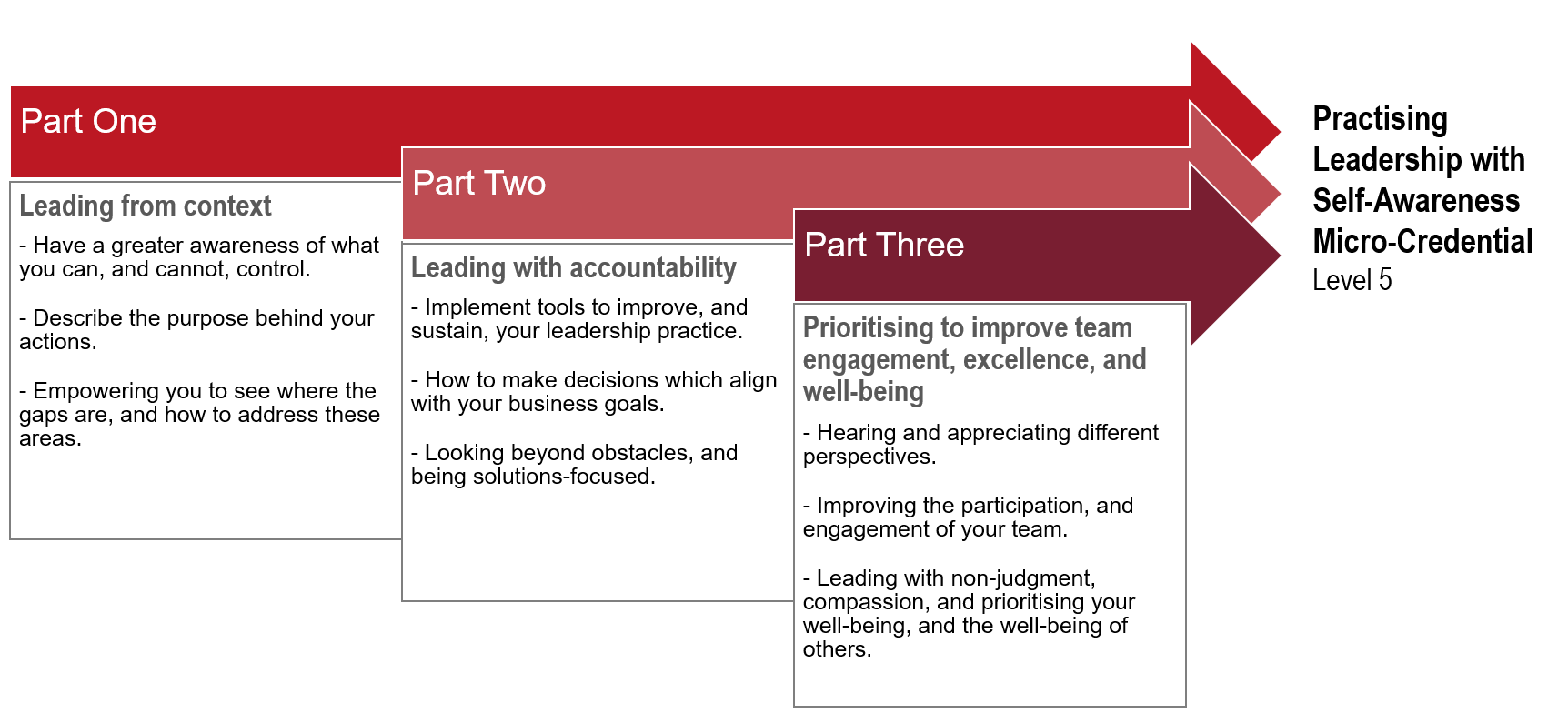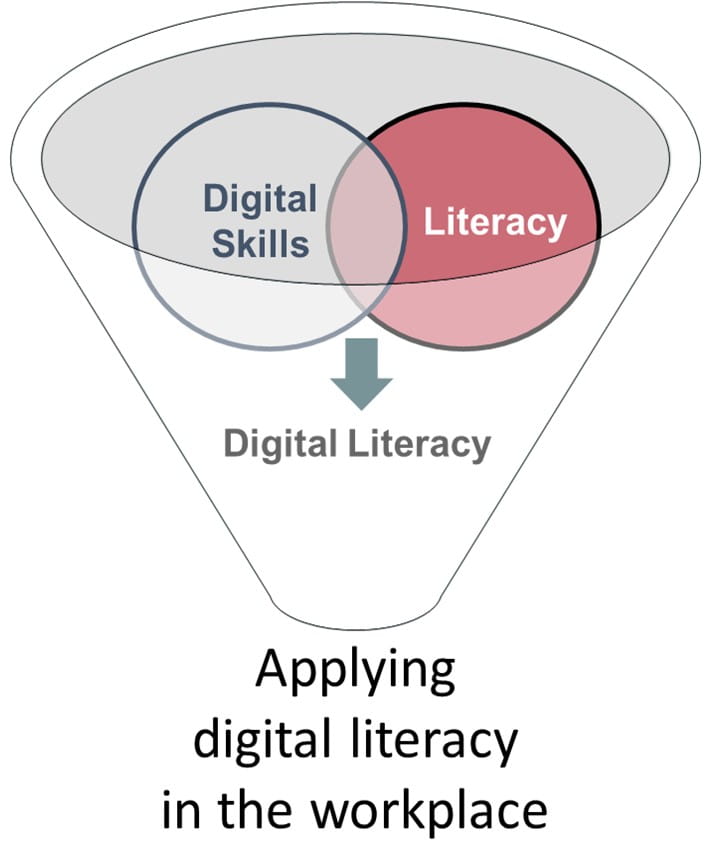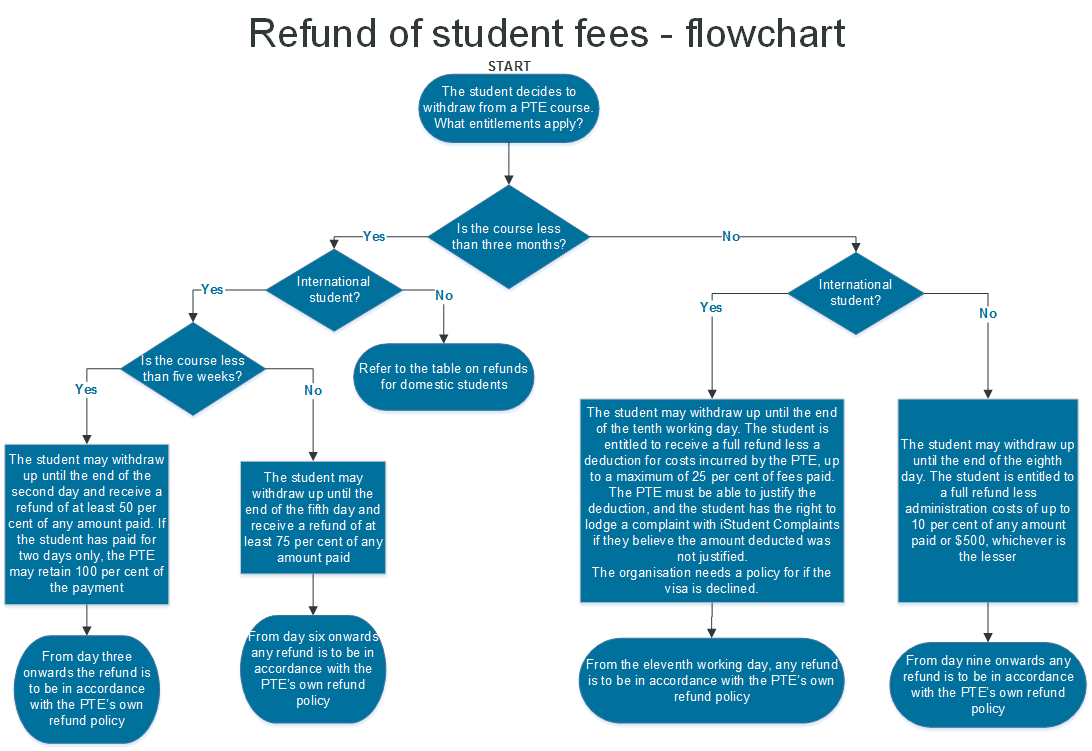A micro-credential is a learning package which certifies achievement of a specific set of skills and knowledge. A micro-credential must be industry-relevant, and target those skills which are necessary in the workplace. Once a participant completes a micro-credential, a certificate of completion is awarded, and reflected on their NZQA Record of Learning.
Micro-Credentials
What is a micro-credential?
Our Micro-credentials
- Consist of a learning programme and an assessment.
- Prioritise exploring the workplace experiences & concerns that you want to address.
- Have a flexible delivery schedule that works for you.
- Approved by the New Zealand Qualifications Authority (NZQA), and sits on the New Zealand Qualifications Framework (NZQF).
Click below to find out more information about each of our micro-credentials:
Leading with Self-Awareness Micro-Credential
Growing the leadership repertoire of managers, supervisors, and team leaders
| Level 5 | 10 Credits | Programme & Assessment |
Programme Aim
This micro-credential is all about empowering individuals to lead themselves. It enables team leaders, managers, and/or supervisors to bring the real workplace issues that are occurring for them to the table, and explore how to problem-solve these in a way that empowers them to make decisions that create win-win outcomes:
What do I bring, and how can I choose to approach this issue in a way where I am solutions focused?

Leading with Self-Awareness Overview

Our Leading with Self-Awareness Alumni
Some of our Alumni chose to focus on:
Being able to further develop positive group culture
To show professionalism, where staff respect and see me as an authoritative member of staff
Building a great team culture
To lead with confidence and integrity when confronting difficult conversations with my work colleagues and manager
Listening as a way of being present
To increase my self-knowledge and self-awareness
Receiving feedback / effective communication / improved self-care
To understand how to show up as me
Entry Requirements
A candidate for admission into the Practicing Leadership with Self-Awareness Micro-credential must:
- Be employed in a position of leadership as either a manager, supervisor, or team leader (of at least three individuals including themselves); and
- Hold a qualification at Level 4 or above on the NZQF; or have experience working at manager/supervisor/team leader level for at least three years, and have managed a team of at least three individuals (including themselves); and
- Be at least 20 years of age.
Note 1: If admission criteria are not met, discretionary entry may be granted by the Academic Board.
Note 2: International students must have an IELTS Academic score of 6.0 overall, or equivalent, with no band less than 5.5.
Contact us at info@nzali.ac.nz for information about scheduling and pricing for this micro-credential.
Workplace Digital Literacy Micro-credential
Developing the digital literacy capability of employees in the workplace
| Level 2 | 6 Credits | Programme & Assessment |
Programme Aim
This micro-credential addresses a fundamental need in Aotearoa New Zealand to promote digital literacy within the workplace, which will assist employees to use smart devices and digital platforms to perform tasks within their roles and responsibilities.
No two workplaces are the same, this programme is tailored to explore the specific digital needs of employees in your workplace.
The ability to access, understand, communicate, evaluate, and use information for a particular purpose is a literacy skill.
Using a smart device to complete a task based on the information that has been accessed is a digital skill.
This micro-credential focuses on integrating these two skillsets, to better equip employees to work with smart devices and digital platforms, to complete relevant workplace tasks.

Entry Requirements
A candidate for admission into the Workplace Digital Literacy Micro-Credential must be:
1. Employed in a workplace where smart devices are a key component of tasks that are being performed.
Note 1: In addition, international students must have an IELTS General score of 5 overall, or equivalent, with no band less than 4.5.
Note 2: Candidates will have to provide documentary evidence to support their application.
Note 3: If admission criteria are not met, discretionary entry may be granted by the Academic Programme Committee.

Contact us at info@nzali.ac.nz for information about scheduling and pricing for this micro-credential.
CRM SYSTEM ADMINISTRATOR | CRM-ADMIN L4
Developing Digital Skills to Use Cloud-Based CRM Software using Drag-and-Drop Declarative Programming Solutions Micro-credential
| Level 4 | 25 Credits | Programme & Assessment |
Programme Aim
To develop digital capabilities when using cloud-based CRM software at an administration level, so that participants can access jobs in workplaces where ‘drag-and-drop’ CRM software is being used.
Overview
This programme takes a wrap-around approach, enabling participants to understand and appreciate the context, application, and communication needs to effectively administer a cloud-based CRM in a New Zealand workplace context.
It offers extensive opportunities for application and use of one of the leading CRMs – Salesforce, which is currently being used by over 300 organisations across Aotearoa New Zealand.



MEET OUR TECH-ED GRADUATES
Click on the profiles below, to learn more about how our graduates found this micro-credential, and what they are doing now.
Entry Requirements
A candidate for admission into the Developing Digital Skills to Use Cloud-Based CRM Software using Drag-and-Drop Declarative Programming Solutions Micro-Credential Level 4 is:
- 18 years of age or older; and
- Has a literacy level at Step 4 / Literacy NCEA Level 1 / Has completed a Certificate Level 3 qualification; and
- Has been employed in a workplace for at least one year, and uses software as part of their role responsibility, OR has related experience and is comfortable with using software and is familiar with navigating themselves through Microsoft Office.
Note 1: In addition, international students must have an IELTS General score of 5.5 overall, or equivalent, with no band less than 5.
Note 2: Candidates may request for a literacy assessment to be conducted. The Ministry of Education, LNAAT literacy assessment will be used.
Note 3: If admission criteria are not met, discretionary entry may be granted by the Academic Programme Committee.
Contact us at info@nzali.ac.nz for information about scheduling and pricing for this micro-credential.
CRM APP BUILDER | CRM-APP L5
Designing, Building, and Deploying Custom Solutions using the Modern Capabilities of CRM Software Micro-Credential
| Level 5 | 15 Credits | Programme & Assessment |
Programme Aim
The purpose of the micro-credential is to provide technical expertise that will enable the learner to understand software applications, designing solutions, building custom applications, business logic, and user interfaces. The learner will be able to use the modern capabilities of CRM software to take a solution through some of the stages of the software development lifecycle.
This micro-credential takes an adult-learning, learner-centred educational approach in addressing the learning needs of non-traditional tech learners.
OUTCOMES
- Design custom applications to be used within a CRM to support business processes and reporting requirements.
- Build custom applications within a CRM software application development platform to support business processes and reporting requirements.
- Manage changes and deploy a CRM software solution using the appropriate features of a CRM software’s application development platform, for the purpose of ensuring successful deployment of a solution.
ENTRY REQUIREMENTS
A candidate for admission into the Designing, Building, and Deploying Custom Solutions using the Modern Capabilities of CRM Software Micro-credential Level 5 is:
- 18 years of age or older.
- Has completed a Level 4 micro-credential in cloud-based CRM software using drag-and-drop declarative programming solutions/or equivalent skills and experience.
- Has been employed in a workplace for at least one year, and uses software as part of their role responsibility.
Note 1: In addition, international students must have an IELTS General score of 5.5 overall, or equivalent, with no band less than 5.
Note 2: If admission criteria are not met, discretionary entry may be granted by the Academic Programme Committee.
Contact us at info@nzali.ac.nz for information about scheduling and pricing for this micro-credential.
CRM SOFTWARE DEVELOPER | CRM-DEV L6
Applied Software Development and Building Custom Solutions using the Modern Capabilities of CRM Software Micro-Credential
| Level 6 | 20 Credits | Programme & Assessment |
Programme Aim
The purpose of the micro-credential is to provide technical expertise that will enable the learner to understand software development, building custom solutions, business logic and user interfaces. The learner will be able to use the modern capabilities of CRM software to take a solution through many of the stages of the software development lifecycle.
This micro-credential takes an adult-learning, learner-centred educational approach in addressing the learning needs of non-traditional tech learners.
OUTCOMES
- Plan the approach to developing a CRM software solution, for the purpose of establishing and outlining upcoming phases of an appropriate software development life cycle.
- Research and compile the business requirements of a CRM software solution, for the purpose of ensuring that the upcoming design of the solution is informed by requirements from appropriate stakeholders.
- Design and develop a CRM software solution by appropriately using custom programming and CRM functionality, for the purpose of solving business requirements.
- Lead a team to complete an activity that contributes to the development of a CRM software solution, for the purpose of solving business requirements.
- Conduct software testing and debugging of a CRM software solution, for the purpose of ensuring the solution is robust and ready for release.
- Conduct software deployment and release management of a CRM software solution, for the purpose of ensuring a smooth release to stakeholders.
- Facilitate software maintenance, support, and establish any ongoing operations needed on a newly deployed CRM software solution, for the purpose of ensuring the solution is regularly checked to be performing as expected for stakeholders.
ENTRY REQUIREMENTS
A candidate for admission into the Applied Software Development and Building Custom Solutions using the Modern Capabilities of CRM Software Micro-Credential Level 6:
- Is 18 years of age or older.
- Has completed a Level 5 micro-credential in designing, building, and deploying custom solutions using the modern capabilities of CRM software/or equivalent skills and experience.
- Has been employed in a workplace for at least one year and uses software as part of their role responsibility.
Note 1: In addition, international students must have an IELTS General score of 6 overall, or equivalent, with no band less than 5.5.
Note 2: If admission criteria are not met, discretionary entry may be granted by the Academic Programme Committee.
Contact us at info@nzali.ac.nz for information about scheduling and pricing for this micro-credential.
CRM BUSINESS ANALYST | CRM-BUS L6
Applied Business Analysis and Solution Design using the Modern Capabilities of CRM Software Micro-Credential
| Level 6 | 20 Credits | Programme & Assessment |
Programme Aim
The purpose of the micro-credential is to enable the learner to understand business needs, capture requirements, and facilitate collaboration with stakeholders to support the development of CRM solutions to drive business improvement.
This micro-credential takes an adult-learning, learner-centred educational approach in addressing the learning needs of non-traditional tech learners.
OUTCOMES
- Plan discovery activities and map current business processes compared to target business processes of a CRM software solution, for the purpose of outlining the potential improvements such as amount of time saved using the new solution.
- Research and compile business requirements, and write user stories of a CRM software solution, for the purpose of ensuring that the proposed solution is informed by input from stakeholders and sourced from guided collaboration meetings.
- Design and build a CRM software solution by using CRM functionality and leveraging refined analysis, for the purpose of solving business requirements.
- Conduct testing of a CRM software solution, for the purpose of validating the solution with stakeholders, showing that it meets the business requirements, and can deliver outlined improvements on stakeholder business processes.
- Facilitate virtual and in-person meetings with team members and stakeholders, appropriately document meetings, for the purpose of conducting and synchronizing with different parties, around the various activities involved in the software development life cycle of the CRM software solution, such as communicating the results of testing a solution.
ENTRY REQUIREMENTS
A candidate for admission into the Applied Business Analysis and Solution Design using the Modern Capabilities of CRM Software Micro-Credential Level 6 is:
- 18 years of age or older.
- Has completed a Level 5 micro-credential in designing, building, and deploying custom solutions using the modern capabilities of CRM software/or equivalent skills and experience.
- Has been employed in a workplace for at least one year, and uses software as part of their role responsibility.
Note 1: In addition, international students must have an IELTS General score of 6 overall, or equivalent, with no band less than 5.5.
Note 2: If admission criteria are not met, discretionary entry may be granted by the Academic Programme Committee.
Contact us at info@nzali.ac.nz for information about scheduling and pricing for this micro-credential.
Micro-Credential Regulations
Note: The following applies to our micro-credentials only; it does not apply to TEC-funded industry training.
TERMS AND CONDITIONS OF ENROLMENT AT NZALI
Applying to NZALI
Applicants are required to provide true and complete information when filling out the application form and attaching documents. Provision of false information may result in the termination of the application/enrolment.
Applicants must review the details of the course they are applying for, to make sure it is the course they want to study, and should consider whether the course will assist them in achieving their career goals and intentions.
A completed NZALI application form is the basis of a contract between the applicant/the applicant’s employer and NZALI.
If entry criteria are met, applicants will receive an Offer of Place letter, which will give advice on course fees (tuition and resource fees), and date and method of payment.
To accept an Offer of Place, applicants must sign one copy of the Offer of Place, and return it, with full payment of all fees, by the due date.
Change of Address or Contact Details
Students are required to notify NZALI immediately if their address or contact details change.
Fee Refund/Withdrawal Policy
Students are required to read the school’s fee refund/withdrawal policy, below.
Acceptable Use Policy for Computers and Information Technology
During orientation, students are required to sign a policy which defines the responsibilities of students when using any computing and information technology facilities provided by NZALI.
Student and Tutor Contract
During orientation, students are asked to sign an agreement that they will:
- Follow NZALI policies and procedures
- Attend classes punctually, and notify NZALI staff if unable to attend
- Be honest in dealings with the other learners/students and with lecturers/tutors
- Try hard to complete any assignments on time, and to work on them to the best of their ability
- Ask for one-to-one sessions when needed
- Try to be co-operative and sensitive to the needs of the lecturers/tutors and other participants.
Guidance for Students
Guidance for students around pathways for further study, employment, and (for international students) residency, is available upon request. Help in writing CVs and covering letters is available, and academic references can be made available to support applications. Information sessions on immigration-related matters, such as work visas and residency, can be arranged with licensed immigration advisors.
Notes on the use of student photos, videos, and testimonials by NZALI
- From time to time NZALI may post photographs, video recordings, and/or written testimonials of students on the NZALI website
- It is NZALI’s policy that any published items will be positive depictions of students.
Note re Consumer Guarantees Act 1993
Where a student’s employer pays the course fees, NZALI hereby contracts out of the Consumer Guarantees Act 1993, and the Consumer Guarantees Act 1993 therefore does not apply to such business-to-business transactions.
NZALI STUDENT WITHDRAWALS, AND FEE REFUNDS, POLICY
This withdrawal and fee refund policy is in accordance with the Education Act 1989 and amendments as implemented by the New Zealand Qualifications Authority, and applies to international and domestic students.
1. If a student fails to start for any reason (including, in the case of an international student, due to failure to obtain a study visa), voluntarily withdraws from, or simply stops attending, any NZALI programme, they must notify the Director of Studies in writing. The date of withdrawal is the date that NZALI receives written notification of withdrawal, or the first day of a protracted period of non-attendance (if a student simply fails to start, or stops attending, class without notification). ‘Day 1’ (for the purposes of calculating how many days have elapsed since the student ‘started’ their programme) is defined as the date tuition actually commenced.
2. Student fee refund amounts are mandated by NZQA up to certain points in courses – refer to the ‘Refund of Student Fees – flowchart’ below. ‘NZALI’s own refund policies’ (mentioned at four places in the flow chart) apply thereafter, and are (note: ‘days’ means calendar days):
Course less than three months
International and domestic students (both the same)
Course less than five weeks: Day 3 onwards, no refund.
Course five weeks or more: Day 6 onwards, no refund.
Course three months or more
International student: From Day 11 onwards, no refund.
Domestic student: From Day 9 onwards, no refund.
All courses: Students who withdraw before the course commences will be entitled to refunds less any amounts allowed to be retained as noted in the flow chart below.
3. You will be advised in writing of the refund decision within 5 working days of your application being received. Any refund due will be paid within 30 days of receipt of application. Refunds will be paid in New Zealand dollars, and will go to the person or organisation that paid the fees, not necessarily the student.
4. If the student is expelled from the course, it is unlikely that any refund will be made.
5. These regulations may be varied in exceptional circumstances that are beyond the control of the student (such as medical or compassionate circumstances). Variation is at the discretion of the CEO.

NZQA-specified withdrawal periods and refund amounts for domestic students on courses of under three months
NZQA specifies the following withdrawal periods and refund amounts for domestic students on courses of under 3 months under section 235(1A) of the Education Act 1989:
| Course length | Withdrawal period | Refund amount |
| For courses of two days or less | None | Any refund is at the PTE's discretion |
| For courses of more than two days but under five weeks | Up to the end of two calendar days of the course commencing | A minimum of 50% of the amount the student paid in respect of the course |
| For courses of five weeks or more but less than three months | Up to the end of five calendar days of the course commencing | A minimum of 75% of the amount the student paid in respect of the course |
Course means a programme or training scheme in which a student is enrolled.
Refund application for other reasons
| Event | Refund amount |
| The signatory (NZALI) ceases to provide a course of educational instruction as contracted with a tertiary learner, whether as the result of a decision by the signatory or as required by an education quality assurance agency; or the signatory ceases to be a signatory; or the signatory ceases to be a provider. | Fees paid for services not delivered, or the unused portion of fees paid shall, in the case of international tertiary learners, be paid to (a) the international tertiary learner (or the learner’s parent or legal guardian); or (b) if directed by the international tertiary learner or the code administrator or the agency responsible for fee protection mechanisms, transfer the amount agreed with the student (or the student’s parent or legal guardian if the student is under 18 years) to another signatory. |





